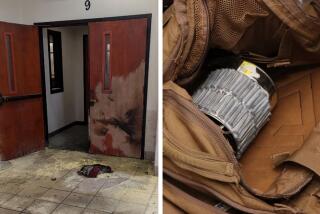New Charges Due in Mail Bomb Case
- Share via
Four months after a mail bomb exploded in the hands of the roommate of its intended target, the roommate has died. And the Costa Mesa man accused of sending the bomb could face the federal death penalty, a legal rarity, federal officials said Friday.
Darryl Anthony Carr, a 34-year-old car painter, was named in a five-count indictment accusing him of sending an explosive device through the mail, resulting in the death of Peter Marshall of Santa Ana, said Thom Mrozek, spokesman for the U.S. attorney’s office in Los Angeles.
Fewer than 20 convicts are on “federal death row” nationwide. One of them is convicted Oklahoma City bomber Timothy McVeigh. Carr’s case is only the fourth in the seven-county central California district to be “death penalty eligible” under the Clinton administration, Mrozek said.
“It’s been a long time since the federal government has executed anyone,” Mrozek said. The last federal execution, he said, was a hanging in 1963.
Marshall was the roommate of a man who worked as a prostitute and went by the name “Jenny,” according to police reports of the Feb. 5 blast on French Street in Santa Ana. Carr was a customer of “Jenny,” who yearned for a deeper relationship but was rebuffed by the prostitute, authorities said.
Incensed, Carr apparently sought revenge, blaming both “Jenny” and roommate Marshall, authorities said. According to the indictments issued Friday, Carr on two occasions fastened homemade bombs to a pickup truck driven by Marshall. One incident was in November 1996 and the second in February 1997, but neither device detonated, investigators said.
In February, according to the indictments, Carr used gunpowder to make a mail bomb disguised as a romantic package that he sent to “Jenny’s” house on French Street for the prostitute’s birthday. Investigators at the time said that when “Jenny” declined to open the package, roommate Marshall took it into the kitchen of the apartment, where he opened it, detonating the bomb, which shattered the windows and shook nearby apartment units.
*
Marshall, whose age was not available Friday, suffered serious injuries from the explosion and from shrapnel, and was in a coma until late March, when he was placed in long-term intensive care at Western Medical Center-Santa Ana, Mrozek said.
Authorities had few details about his death, which occurred Wednesday morning, and officials of the Orange County coroner’s office said they could not provide further information because of the federal charges.
Carr has been held in federal custody since his arrest in February and will be arraigned on the new indictments next week, Mrozek said.
Before Marshall died, Carr was facing a 30-year prison sentence under federal charges for making and mailing an illegal explosive. Because of Marshall’s death, Carr is eligible for the federal death penalty, but a recommendation for the death penalty is not automatic.
Under strict protocols, a recommendation to seek the death penalty first must be made by the primary federal prosecutor to a review committee at the district-level U.S. attorney’s office. The committee makes its recommendation to the U.S. attorney, who also reviews the case and issues a recommendation to the U.S. Justice Department.
In Washington, another committee must review the recommendation and make its suggestions to Atty. Gen. Janet Reno. The entire process can take several months, Mrozek said.
More to Read
Sign up for Essential California
The most important California stories and recommendations in your inbox every morning.
You may occasionally receive promotional content from the Los Angeles Times.













